Related Research Articles
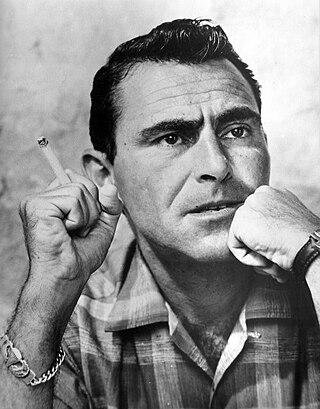
Rodman Edward Serling was an American screenwriter and television producer best known for his live television dramas of the 1950s and his anthology television series The Twilight Zone. Serling was active in politics, both on and off the screen, and helped form television industry standards. He was known as the "angry young man" of Hollywood, clashing with television executives and sponsors over a wide range of issues, including censorship, racism, and war.
The year 1969 in television involved some significant events. Below is a list of television-related events in 1969.
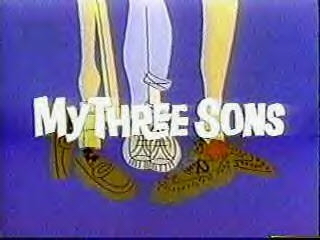
My Three Sons is an American television sitcom that aired from September 29, 1960, to April 13, 1972. The series was filmed in black-and-white and broadcast on ABC during its first five seasons, before moving to CBS for the remaining seven seasons, which were filmed in color. My Three Sons chronicles the life of widower and aeronautical engineer Steven Douglas as he raises his three sons.

Pee-wee's Playhouse is an American comedy children's television series starring Paul Reubens as the childlike Pee-wee Herman that ran from 1986 to 1990 on Saturday mornings on CBS, and airing in reruns until July 1991. The show was developed from Reubens's popular stage show and the TV special The Pee-wee Herman Show, produced for HBO, which was similar in style but featured much more adult humor.

Carolyn Sue Jones was an American actress of television and film. She began her film career in the early 1950s, and by the end of the decade had achieved recognition with a nomination for an Academy Award for Best Supporting Actress for The Bachelor Party (1957) and a Golden Globe Award as one of the most promising new actresses of 1959. Her film career continued for another 20 years. In 1964, Jones began playing the role of matriarch Morticia Addams in the black and white television series The Addams Family.
The following is the 1959–60 network television schedule for the three major English language commercial broadcast networks in the United States. The schedule covers primetime hours from September 1959 through March 1960. The schedule is followed by a list per network of returning series, new series, and series cancelled after the 1958–59 season.
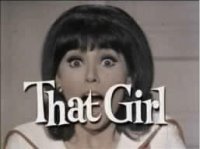
That Girl is an American television sitcom that ran on ABC from September 8, 1966, to March 19, 1971. It starred Marlo Thomas as the title character, Ann Marie, an aspiring actress who moves from her hometown of Brewster, New York, to try to make it big in New York City. Ann has to take a number of offbeat temp jobs to support herself in between her various auditions and bit parts.

Playhouse 90 is an American television anthology drama series that aired on CBS from 1956 to 1960 for a total of 133 episodes. The show was produced at CBS Television City in Los Angeles, California. Since live anthology drama series of the mid-1950s usually were hour-long shows, the title highlighted the network's intention to present something unusual: a weekly series of hour-and-a-half-long dramas rather than 60-minute plays.
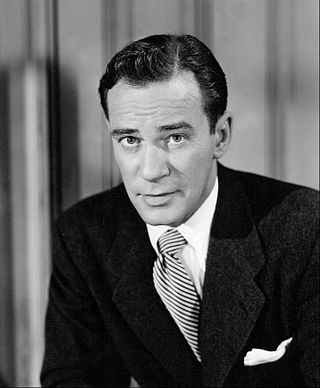
Richard Dutoit Carlson was an American actor, television and film director, and screenwriter.

An anthology series is a written series, radio, television, film, or video game series that presents a different story and a different set of characters in each different episode, season, segment, or short. These usually have a different cast in each episode, but several series in the past, such as Four Star Playhouse, employed a permanent troupe of character actors who would appear in a different drama each week. Some anthology series, such as Studio One, began on radio and then expanded to television.
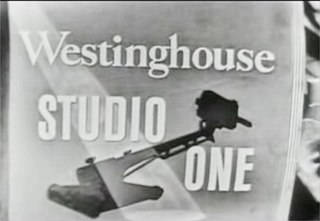
Studio One is an American anthology drama television series that was adapted from a radio series. It was created in 1947 by Canadian director Fletcher Markle, who came to CBS from the CBC. It premiered on November 7, 1948, and ended on September 29, 1958, with a total of 467 episodes over the course of 10 seasons.

Martin Ellyot Manulis was an American television, film, and theatre producer. Manulis was best known for his work in the 1950s producing the CBS Television programs Suspense, Studio One Summer Theatre, Climax!, The Best of Broadway and Playhouse 90. He was the sole producer of the award-winning drama series, Playhouse 90, during its first two seasons from 1956 to 1958.
David Arnott is an American actor, screenwriter and musical composer living in Southern California. Among his credits, Arnott co-wrote Last Action Hero, and starred in The Last Man with Jeri Ryan. David is a member of the legendary "Pad O' Guys" screenwriting group, including Shane Black and Fred Dekker, and is the son of banjo player Peter R. Arnott. He also provided additional voices in Happy Feet Two and Finding Dory.

Charles Francis Maxwell was an American actor who served as president of the American Federation of Television and Radio Artists from 1984 to 1989.
"Sadbird" is the second television play episode of the third season of the American television series CBS Playhouse. The episode was a coming-of-age drama about a young man finding his own in the toy business after years of rejecting the corporate lifestyle.
The CBS Sunday Movie is the umbrella title for a made-for-TV and feature film showcase series originally airing from 1941 on CBS until the end of the 2005–2006 television season, when it was replaced with a drama series. It was the last of the weekly Sunday night movie showcases aired by the Big Three television networks to be canceled, outside of special event premieres and the network's previous run of the Hallmark Hall of Fame film anthology.
"The Sounds of Eden" was an American television play broadcast live on October 15, 1959, as part of the CBS television series, Playhouse 90. It was the second episode of the fourth season of Playhouse 90 and the 119th episode overall.

"Helen Morgan" is an American television play broadcast on May 16, 1957, as part of the CBS television series, Playhouse 90. It was the 33rd episode of the first season of Playhouse 90.
My Friend Flicka is an American children's Western television series. The series is based on the novel of the same name by Mary O'Hara and the 1943 film My Friend Flicka by 20th Century Fox. It was one of the first television series produced by TCF Television Productions. Though filmed in color, it was originally shown on CBS in black-and-white from February 10, 1956 until May 18, 1958. Only one season was produced, but was broadcast in syndicated reruns for many years, starting in September 1957 on NBC.
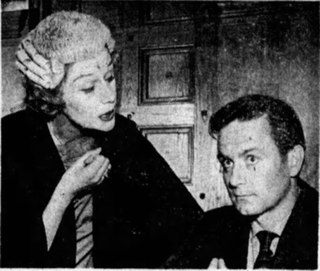
"The Second Man" was an American television play broadcast live on February 12, 1959 as the 100th episode of the CBS television series, Playhouse 90. The cast was led by James Mason. The teleplay was written by Leslie Stevens as an adaptation of the novel, The Second Man, by Edward Grierson.
References
- ↑ TV.com: CBS Playhouse: Saturday Adoption